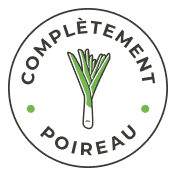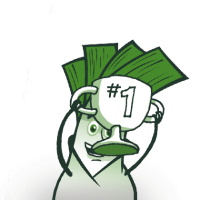Vegetarianism has been on the rise over the past few years. In fact, all you have to do is visit a bookstore to see that they abound with literary works about this diet practice. Is it a trend or a duty? Good question.
On one hand, scientific evidence shows that our consumption of excessive animal products has a worrisome impact on our health as well as the environment. On the other hand, removing all animal products from the human diet is not necessary to improve the state of the situation.
Vegan, Vegetarian, Flexitarian...It's all Greek to Me!
Vegetarianism is a practice of consumption. There's various types of vegetarianism which varies from strict vegetarianism, also known as veganism, to flexitarianism, which means semi-vegetarian.
On a 'vegan' plate, you'll find only vegetal products. Thus, no meat, fishes, eggs, dairy products or other animal products such as chicken broth, gelatin or honey. This nutritional practice has a foundation in a life philosophy as vegans refuse all products coming from exploiting animal suffering. In summary, vegans do not wear leather and will not use cosmetic products that have been tested on animals.
On the other hand, ovo-lacto-vegetarians avoid meat, poultry and seafood. However, they will eat dairy products and eggs. Some will even stretch this form of vegetarianism to include fish and only exclude meat and poultry from their diet.
The Weight of Meat on our Ecology
Over the past few years, documentaries such as Cowspiracy and The Hidden Benefits of Eating Less Meat have brought to light the effects of over-consumption of meat both in terms of health as well as ethics and ecology.
These TV productions present subjects from specific angles and in the case of meat raising and consumption force us to reconsider. They are essential in helping us take an interest in our food as our agri-food system is anything but sustainable at present. We spend more energy in producing, transforming and transporting our food than the energy it contains.
- Animal food production is responsible for 14.5% of greenhouse gas linked to human activity, the equivalent of all methods of transportation combined.
- Meat eaters produce double the amount of greenhouse gases per kilogram of CO² than vegetarians.
- Beef and dairy production are responsible for two thirds of greenhouse gases linked to animal production.
- According to a North American study, if we do not change our fishing practices, we will have exhausted these precious marine nutriments by 2048.
Rethinking our global food production model and making choices on our plates are more of a duty than a trend.
But...Where to Start?
Health professionals recommend a baby-step method. That means modifying your dietary habits one step at a time. This method is more accessible and realistic than the all or nothing method.
Many countries, including Canada, have launched initiatives such as "Meat-free Mondays." These campaigns have built sites that propose vegetarian meals once a week. They are a goldmine of great recipe ideas, tips and advice to make it happen simply. This kind of gradual change may seem trivial, but collectively can have an important effect.
Are vegetarians more likely to have dietary deficiencies than omnivores?
Making poor food choices and eating highly transformed products expose both omnivores and vegetarians to deficiencies!
However, eating 'vegan' means that you must find alternative solutions to precious protein found in meat and so important for your health.
Protein is composed of amino acids, nine of which are essential. That means that the body is not able to produce them and they must be drawn from our diet. Meat is one of the most complete sources of protein because it contains the nine essential amino acids. On the other hand, with the exception of soy, vegetal products rich in protein are incomplete. Varying with nuts, grains, legumes and cereal products on a daily basis will ensure protein combining to add all the amino acids that humans require.
Better to Reduce Than Do Nothing at All!
In short, adding more vegetable products to one's diet is not a trend, but rather our duty. We can preserve our resources and the health of our population simply by making dietary choices. Should we embrace the entire vegan dietary philosophy? Probably not.
The following actions will have a significant impact on health and the planet:
- Reduce the portions of meat on your plate and increase servings of vegetable products.
- Choose local products that have not traveled as far to reach your plate.
- Contribute to saving our marine life that is rapidly declining by choosing products from renewable fishing sources.
Are You Convinced Yet?
Choose THE best tip for adding vegetable products to your diet: green up the classics.
The next time you want to make shepherd's pie, replace half of the meat with lentils. Or yet again, in your Italian spaghetti sauce, substitute half the meat with crumbly tofu.
Ready to Make Some Discoveries?
Try our delicious vegan recipes that are also super nutritious!




